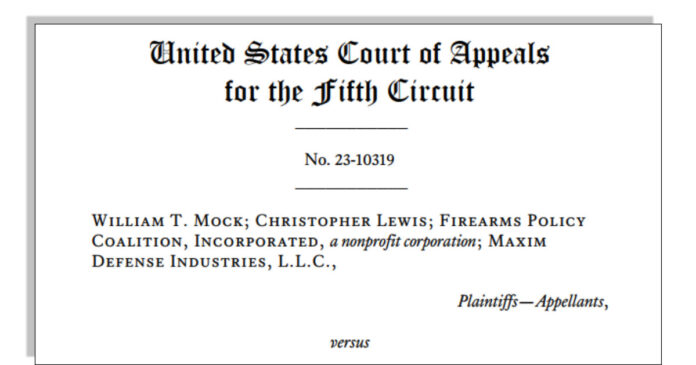
My plan to do nothing regarding my AR pistols braces until the 30th appears to be paying off. After a court decision on Wednesday and another on Thursday showed things might be leaning our way, I decided not to submit my gun to the ATF and have it turned into an SBR.
On Friday, the good news continued as the Fifth Circuit released an order clarifying that its injunction in the case of Mock v. Garland applies not just to the individual plaintiffs, but to their members and customers. Because I am a member of the Firearms Policy Coalition (FPC), one of the plaintiff’s, the injunction should stop the Feds from enforcing their pistol brace rule against me, at least until the next court ruling. Until then, the court preserved the status quo ante, which means the previous state of affairs. The court has stopped the law from going into effect for FPC members and customers of Maxim Defense.
I predict the FPC’s membership, estimated to be around 1 million people, will soar after this ruling. If you’d like to join, go to the FPC website and sign up for membership. You can also read their press release, which includes links to the court order.
If you are a member of the Gun Owners of America or the Second Amendment Foundation, there’s a good chance that members of those organizations will also be granted injunctive relief before the rule goes into effect.
A Bad Week for Federal Agencies
It’s been a losing week for government overreach. Besides at least two courts issuing preliminary injunctions against the ATF’s arm brace rule, the EPA got smacked down by the Supreme Court decision on Sacket v. EPA. In each case, the courts refused to allow the agencies to extend their power beyond the intent of congress.
If you recall your political science or civics course, the separations of power means the Congress creates the laws. When an administrative agency’s interpretation of the law goes beyond the words Congress enacted, then they are violating the separation of powers and exceeding their mandate. The Supreme Court and lower courts have now acted in multiple cases to limit the agencies’ enforcement powers to those that were intended. This means the pendulum is swinging back towards the center after these agencies stretched issues regulations to expand their powers.
Administrative Issues
The ATF also complicated the arm brace situation by allowing them to be used on AR pistols and other pistols for a decade. At least one of my arm braces came with a copy of the ATF letter that said it was a legal device. At one point, the ATF said you could not put braces on your shoulder. Not long after, they changed their mind.
After Biden’s election, the ATF set about “reinterpreting” the law. The process was so complicated that the rule banning pistol braces was almost 300 pages long. (Note that it is a rule, not a law.)
Further complicating matters, there have been some discrepancies since the rule was issued, compounded by the ATF Director’s testimony to Congress, about whether you can remove the brace or have to destroy it. Yes, the ATF rule is so screwed up, even the agency’s director doesn’t know what it says.
More Freedom to Come
In recent months, courts have stopped laws that ban people under 21 from buying rifles, ruled against red flag laws that assume you are guilty until proven innocent, and stopped state-level magazine and assault weapon bans. But there is more to come.
I predict this ATF rule will eventually be overturned, even though the administration will appeal it all the way up to the Supreme Court. ATF rules regarding 80 percent receivers will probably be overturned next, followed by bump stock prohibitions. Will the ATF give up? Not under Biden. Likewise, I expect states like New York and New Jersey to keep trying to limit concealed carry, magazine capacity and assault weapon ownership, even though recent Supreme Court cases clarify that those actions are unconstitutional.
The courts are saying if Congress wants to ban bump stocks or pistol braces, they have to pass a law that does so. The ATF cannot re-imagine existing laws to ban products they don’t like. Even if Congress were to pass a ban on these items, there’s a good chance that the Supreme Court would rule such a law unconstitutional. They are taking “shall not be infringed” more seriously, which is the founder’s intent.
Keep in mind that I am not an attorney and nothing in this article or elsewhere on the website should be considered legal advice.







